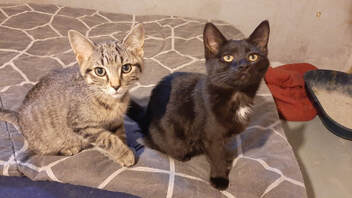 **I am NOT a veterinary professional, this is all my own opinion based on my own experience and research. I will include further resources below** Over the years, we've lost several kitties and been made aware of several adopted kitties who have passed away (likely) from something called FIP. Feline Infectious Peritonitis, or FIP can happen when a virus that almost all kitties (especially in a rescue/shelter setting) are exposed to, mutates in a largely unknown way, and they are not able to fight it off. There are different types of FIP and it cannot currently be accurately diagnosed. However, there are warning signs, and tests that can be run that give 'clues' that kitties symptoms may be stemming from FIP, but no clear cut test. In the past, if a kitty was suspected of having FIP, typically they were humanely euthanized... FIP was a death sentence. BUT, there is some good news. In February 2019, a study was published by UC Davis (General Feline Infectious Peritonitis Resources) regarding the efficacy of a new drug against FIP. This was a BIG deal, and the study showed GREAT results - showing that FIP may in fact be treatable. 25 of the 31 cats studied were successfully treated. However, this drug has NOT approved or made widely available for use... yet! But it has been shown over and over again to be effective in kitties 'diagnosed' with FIP. It is also extremely expensive. Approximately 1 week's worth of injections is almost $100. With at least 12 weeks of injections and regular vet visits and blood work and other testing, it's not an easy process... but it is a HUGE leap for FIP kitties - FIP may no longer be the death sentence it has been for so long. In 2020, we noticed one of our foster kittens, Stitch, was acting funny, not gaining weight like he should, but had a BIG BIG belly. It was FULL of fluid, a telltale sign of FIP. We worked with our vets to do bloodwork and diagnostic testing and he was 'diagnosed' with FIP. Typically at this point, kitties are not eating, have no energy, are lethargic, and you can tell they don't feel good. Typically they don't have long. Stitch though was still semi-energetic, still eating and drinking, and we thought he would be a good candidate to try this new treatment. TO BE CLEAR - this was NOT prescribed or provided by our vet. We reached out to some experienced contacts, discussed the process with Stitch's foster at length and decided to try, with the support of our vet. Stitch received an injection for 84 days and was very closely monitored to ensure that he moved in the right direction throughout the process. Stitch made it through all his awful injections, and 84 more days of close observation, and was considered 'cured' in 2021. He's now in his forever home, he got adopted with his sister, who kept him company through his treatment, Lilo! If you or your vet suspect a kitty might have FIP - there are options!! Don't give up! Further Reading: - Researchers study crowdsourced cure for deadly cat disease (Veterinary Information Network News Service) - Unlicensed GS-441524-Like Antiviral Therapy Can Be Effective for at-Home Treatment of Feline Infectious Peritonitis (MDPI Journal, Animals) - Efficacy and safety of the nucleoside analog GS-441524 for treatment of cats with naturally occurring feline infectious peritonitis (Journal of Feline Medicine and Surgery) - Confusion besets first legal FIP treatment in US (Veterinary Information Network News Service)
0 Comments
Your comment will be posted after it is approved.
Leave a Reply. |
Photo from Bennilover

 RSS Feed
RSS Feed